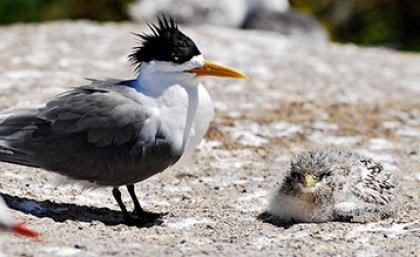
A University of Queensland researcher has led the development of an International Union for Conservation of Nature (IUCN) green list of the world’s best-managed protected areas.
Professor Marc Hockings, from the School of Geography, Planning and Environmental Management, chairs the IUCN’s World Commission on Protected Areas science program.
He said the green list project reversed the usual trend of focusing on conservation failures.
“Rather than focusing on the areas in which we are failing, our aim was to celebrate areas that are succeeding, to recognise good management and to inspire improvement,” Professor Hockings said.
“Green-listed sites will gain greater international recognition, increased political support, interest in quality tourism and stronger motivation among managers and other staff.”
The pilot list includes 23 sites, including two in Australia.
Professor Hockings led the project, which assessed 50 candidate sites from eight countries against criteria including management effectiveness, fair and transparent sharing of the costs and benefits of conservation, equitable governance and visitor experience.
Australia’s green-listed sites are Montague Island Nature Reserve off the New South Wales Coast, which is a critical seabird breeding site, and Arakwal National Park/The Cape Byron State Conservation Area in Byron Bay, managed together with the Aboriginal Arakwal traditional owners.
“These sites have natural, Aboriginal and historic heritage values which are supported by local communities and provide a thriving tourism industry,” Professor Hockings said.
“Well-managed protected areas not only conserve biodiversity. They also provide a wealth of benefits to communities and solutions to global challenges such as water provision, food security, human health and welfare, disaster risk-reduction and climate change.
“The list will benchmark progress towards effective and equitable management and assist governments and their conservation partners to meet the Convention on Biological Diversity target for effective and equitable management of the world’s protected areas.
“By rewarding innovation, excellence and enterprise, we hope to achieve greater benefits for humans and nature.”
Media: Professor Marc Hockings, m.hockings@uq.edu.au, 0422 842 714.




